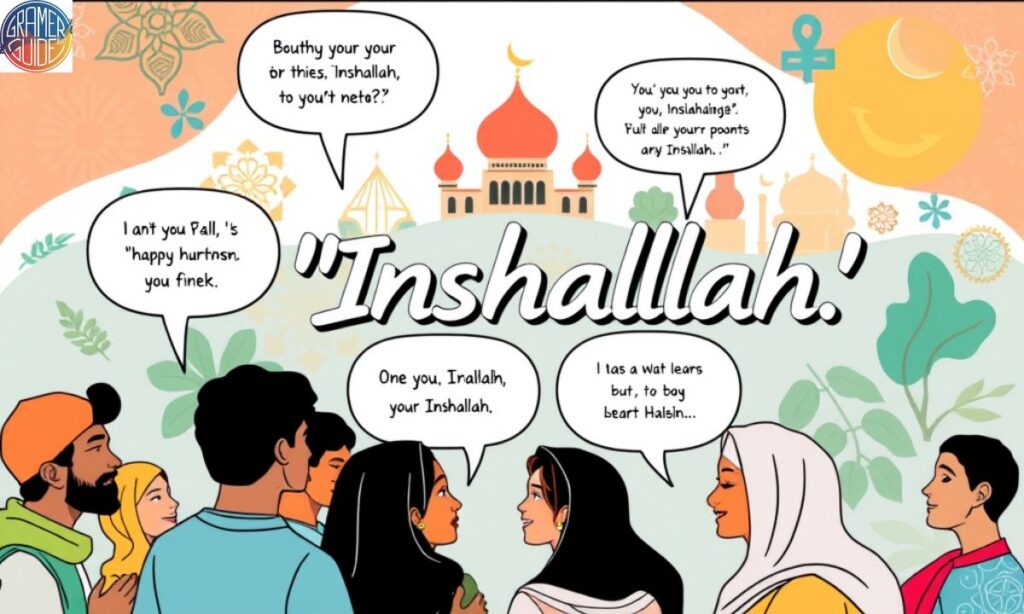Inshallah is a phrase deeply rooted in faith, used by many to express hope and trust in God’s will. It’s more than just words; it carries meaning and belief. When someone says “Inshallah,” they are entrusting their future to a higher power. Knowing how to respond to it shows respect for faith and culture. This guide will help you navigate the best replies to “Inshallah.”
Importance of Acknowledging ‘Inshallah’
When someone says “Inshallah,” they are expressing their faith in God’s will. Acknowledging this shows that you respect their belief in divine will. A simple “Inshallah, I hope so” reinforces your understanding and respect for their faith.
Acknowledging “Inshallah” also shows you are not trying to control outcomes. You recognize that certain things are out of our hands. This can bring a sense of peace to conversations, reminding everyone that things unfold as they are meant to.
Lastly, acknowledging “Inshallah” shows humility. You’re accepting that the future is uncertain and out of your control. This fosters a sense of shared hope and brings people closer together through mutual respect for a higher power.
When Unsure How to Respond
If you’re unsure how to respond, it’s best to reply with neutrality. A phrase like “Inshallah, we will see” maintains hope without making a commitment. This keeps the conversation respectful while expressing your uncertainty.
Alternatively, keep your reply simple and polite. Saying, “Inshallah, I trust everything will work out” shows hope without forcing a response. This allows you to remain neutral while respecting the person’s faith.
If in doubt, avoid offering false assurance. Saying, “Inshallah, it’s all under control” might not feel genuine if you’re unsure. A more honest and cautious response builds trust and keeps the conversation sincere.

Affirmative or Agreement
When someone says Inshallah, you can agree with them in a positive way. These replies show that you support the idea and believe it will happen.
- Absolutely Inshallah, it will happen soon
- Yes for sure, if Allah wills
- Definitely, we are hopeful
- Sure thing, Inshallah
- That sounds great, may Allah make it happen
- I believe it will, Inshallah
- Inshallah, looking forward to it
- Of course, let us stay hopeful
- For sure, may it go as planned
- Agreed, if it is meant to be
- Yes, I trust it will happen
- Surely, with Allah’s help
Expressing Faith or Hope
These replies reflect your trust in Allah’s plan. You are hopeful and faithful about the future.
- May Allah make it easy
- We can only hope and pray
- I trust Allah’s wisdom
- Hope it goes well Inshallah
- Faith is what keeps us going
- Inshallah it turns out good
- Let’s stay hopeful always
- Believing in the best outcome
- Hoping for success ahead
- Keeping faith in every step
- Everything in Allah’s hands
- With faith, we move forward
Gratitude or Submission to God’s Will
Sometimes a reply to Inshallah shows you are grateful and accept Allah’s will. Here are some ways to say that.
- Alhamdulillah for everything
- Whatever Allah wills is best
- I am thankful for today
- Submitting to Allah’s plan
- We trust His decisions
- May His will be done
- Allah knows what is right
- Feeling grateful always
- We leave it in His hands
- Accepting what comes next
- Happy with what He decides
- Thanks to Allah for guidance
Encouragement or Support
When someone shares their hopes with Inshallah, these replies can encourage them.
- You can do it, Inshallah
- Keep going, Allah is with you
- Don’t give up, stay strong
- You’ve got this, Inshallah
- May your dreams come true
- Sending you positive vibes
- I believe in you always
- Allah supports the patient
- Keep moving forward
- You’re doing great, keep it up
- Inshallah, you’ll reach your goal
- May Allah bless your journey
Cautious or Neutral Optimism
These replies show that you are hopeful but also careful. You recognize that things are not certain.
- Inshallah, let’s see what happens
- Hopefully it works out
- Things are looking good, Inshallah
- Let’s stay realistic and hopeful
- Not sure, but I hope so
- Inshallah, time will tell
- It’s possible, let’s wait and see
- Could be, we’ll find out soon
- Let’s be careful but optimistic
- I hope it turns out fine
- We’ll take it step by step
- Inshallah, if all goes well
Expressing Patience
These replies are good when things take time. Patience and trust are key.
- Patience is a virtue
- Good things take time
- Inshallah, it will come
- Let’s wait with faith
- Time will bring answers
- We must stay patient
- Slowly but surely
- Allah rewards the patient
- Don’t rush, trust the process
- One step at a time
- Things happen when they should
- Inshallah, just give it time
Joking or Light-Hearted
These replies keep things fun. Use them with friends when the mood is light.
- Inshallah, but I’m not betting on it
- Maybe after ten years
- If Allah and the alarm clock agree
- Inshallah, but you know how things go
- Let’s hope the stars align
- Inshallah, if I wake up on time
- I’ll believe it when I see it
- Let’s hope miracles happen
- Inshallah, and maybe with pizza
- Sure, Inshallah and coffee too
- I’ll start when I stop procrastinating
- Inshallah, when pigs fly
Prayers and Blessings
Replies with prayers show that you are not only agreeing but also wishing them well.
- May Allah bless your plans
- Praying for your success
- Inshallah, you’ll be guided
- May it happen with ease
- Sending duas your way
- May your wishes come true
- Allah’s mercy be with you
- May He protect your steps
- Inshallah, with His blessings
- May your efforts bear fruit
- Praying it all works out
- Allah is always near
Deflecting or Non-Committal
Sometimes you want to respond without making a promise. These replies help you do that.
- Inshallah, we’ll see
- Let’s talk about it later
- Maybe, time will tell
- Inshallah, can’t say for sure
- Not sure yet, but let’s hope
- We’ll find out soon enough
- I’ll think about it
- Can’t promise, Inshallah
- Let’s wait and see
- It depends, Inshallah
- Possibly, if things align
- We’ll see what happens
Disappointment or Doubt
These replies are used when you are unsure or even disappointed.
- Inshallah, but I’m not too sure
- I’ve heard that before
- Sounds doubtful to me
- Not getting my hopes up
- Inshallah, maybe not this time
- Doesn’t seem likely
- I’m trying not to expect much
- We’ll see, but I’m skeptical
- Not holding my breath
- Inshallah, but I’ve learned
- Been let down before
- I’ll believe it when it happens
Conditional Responses
These replies add a condition to the hope expressed in Inshallah.
- Inshallah, if I’m free
- If it’s possible, then yes
- Inshallah, if everything works out
- If I finish in time
- Only if I get approval
- Inshallah, if the weather allows
- If my schedule clears
- I will if I can
- Inshallah, if things go right
- Only if I’m feeling better
- If no issues come up
- Inshallah, if nothing stops us
Acknowledging Uncertainty
These replies show that you don’t know what will happen, but you are open.
- Who knows, Inshallah
- It’s hard to say now
- Could go either way
- Anything is possible
- We’ll have to wait and see
- I hope so, but I’m unsure
- It’s all in Allah’s hands
- Let’s see what life brings
- Too early to tell
- Can’t be certain yet
- Inshallah, but let’s be honest
- No one really knows
Expressing Concern
These replies show worry or fear about the situation.
- I hope it’s safe
- Inshallah, everything goes well
- I’m a bit worried
- Let’s pray for safety
- I have concerns
- May nothing bad happen
- I’m hoping for the best
- Let’s be careful
- This could be risky
- Inshallah, no harm comes
- It’s a serious matter
- Hoping for a good outcome
Encouraging Patience and Perseverance
These replies offer motivation to stay strong and not give up.
- Keep going, Inshallah it will work
- Don’t stop now
- Keep faith and move forward
- Inshallah, success takes time
- Stay steady on the path
- Allah is with the patient
- Inshallah, your time will come
- One day at a time
- Keep trying your best
- Hold on, it gets better
- Inshallah, you’re almost there
- Keep your head up always
Cultural Sensitivity in Responses
Being aware of cultural differences is important when replying to “Inshallah.” In many cultures, it’s more than just a phrase; it’s a deep reflection of faith. Understanding its significance helps in giving respectful replies. Acknowledge the cultural context, and always reply with sensitivity.
Avoid using the phrase in a dismissive or sarcastic manner. If unsure, it’s better to stay neutral rather than giving a casual or inappropriate response. A thoughtful reply is appreciated, as it shows you respect their beliefs. Always be mindful of the religious and emotional weight behind “Inshallah.”
Using polite, affirmative responses is usually safe in these situations. Keep your replies genuine and considerate. A respectful acknowledgment, like “Inshallah, it will happen,” shows faith without being overbearing. This helps maintain a positive cultural exchange.
Common Mistakes to Avoid
One common mistake is replying without understanding the deeper meaning of “Inshallah.” It’s not just a word but a way of life for many. Simply saying “Inshallah” when you don’t understand its weight can come off as insincere. Always make sure your response reflects understanding.
Another mistake is overpromising when replying. “Inshallah” indicates a hope, not a guarantee. Saying “Yes, it will definitely happen” can be misleading. Stick to hopeful and realistic phrases like “Inshallah, we hope for the best.”
Lastly, avoid ignoring or dismissing “Inshallah” entirely. If someone shares this phrase with you, replying with indifference can seem rude. Even a simple, polite response like “Inshallah, I agree” shows respect for their beliefs and culture.
Responses in Different Situations
In a formal setting, use respectful and professional replies. Something like “Inshallah, I hope it works out” conveys politeness. Keep your tone serious, as this aligns with the more formal use of the phrase in many settings.
In informal situations, a light-hearted or positive reply is acceptable. You could say, “Inshallah, we’re ready for whatever comes.” This adds a friendly touch without taking away from the importance of the phrase. Be mindful of the mood and relationship.
In more uncertain scenarios, it’s okay to reply cautiously. For example, “Inshallah, let’s see what happens” maintains hope without making promises. It’s always good to acknowledge that life is unpredictable while staying hopeful.
Related Expressions to ‘Inshallah’
There are various similar phrases used in different cultures. “Bismillah” is used to invoke God’s blessing at the beginning of something. It shows a desire for God’s help. Like “Inshallah,” it reflects a reliance on divine will.
Another related phrase is “Mashallah,” which expresses praise or gratitude. It’s often used to acknowledge something good. This can be a positive response after hearing good news, much like “Inshallah.”
Finally, “Barakallah” is used to offer a blessing or well-wishing. It’s an expression of hope for blessings and good fortune, similar to the sentiment behind “Inshallah.” These phrases all show a deep respect for divine will and offer comfort in different ways.
FAQ’s
What does “Inshallah” mean?
“Inshallah” means “If God wills.” It’s an expression of faith and hope for the future.
How should I respond to “Inshallah”?
The best responses are respectful and show your understanding of its meaning, like “Inshallah, I hope so.”
Can I use “Inshallah” casually?
While it can be used casually, it’s important to be mindful of the cultural and religious significance it holds.
Is it okay to say “Inshallah” in professional settings?
Yes, but keep it respectful and in line with the context, especially in formal or business environments.
What if I’m unsure how to reply to “Inshallah”?
If unsure, a simple and neutral response like “Inshallah, let’s wait and see” is appropriate.
Conclusion
In conclusion, replying to “Inshallah” shows respect for the speaker’s faith. It’s not just about words but understanding the meaning behind them. Whether casual or formal, always ensure your response reflects humility and hope. Responding thoughtfully will strengthen your connection and show your respect for different cultures and beliefs.

I’m Hayyat, a passionate content writer and SEO expert with 5 years of experience. I specialize in creating engaging content and optimizing it for search engines.





